重庆市渝北区Unit 3 Could you please tell me where the restrooms are? Section B (2a-2d) 说课比赛课件
文档属性
| 名称 | 重庆市渝北区Unit 3 Could you please tell me where the restrooms are? Section B (2a-2d) 说课比赛课件 | 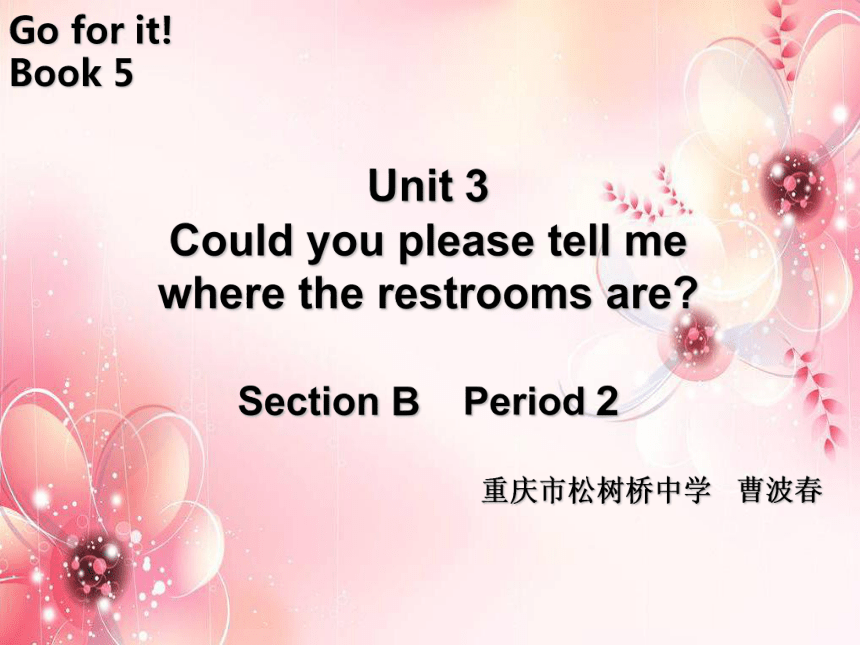 | |
| 格式 | zip | ||
| 文件大小 | 740.0KB | ||
| 资源类型 | 教案 | ||
| 版本资源 | 人教新目标(Go for it)版 | ||
| 科目 | 英语 | ||
| 更新时间 | 2016-01-03 19:11:36 | ||
图片预览

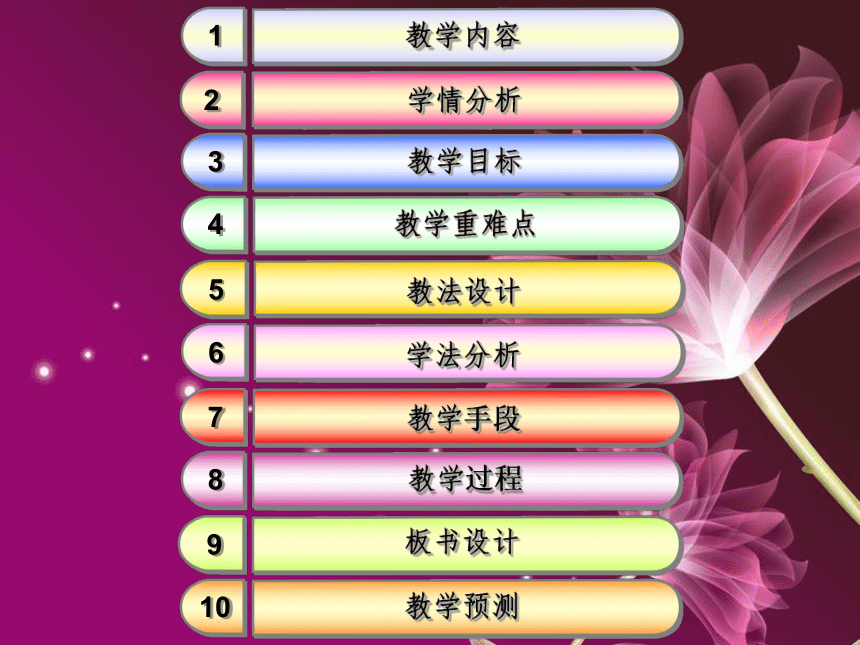
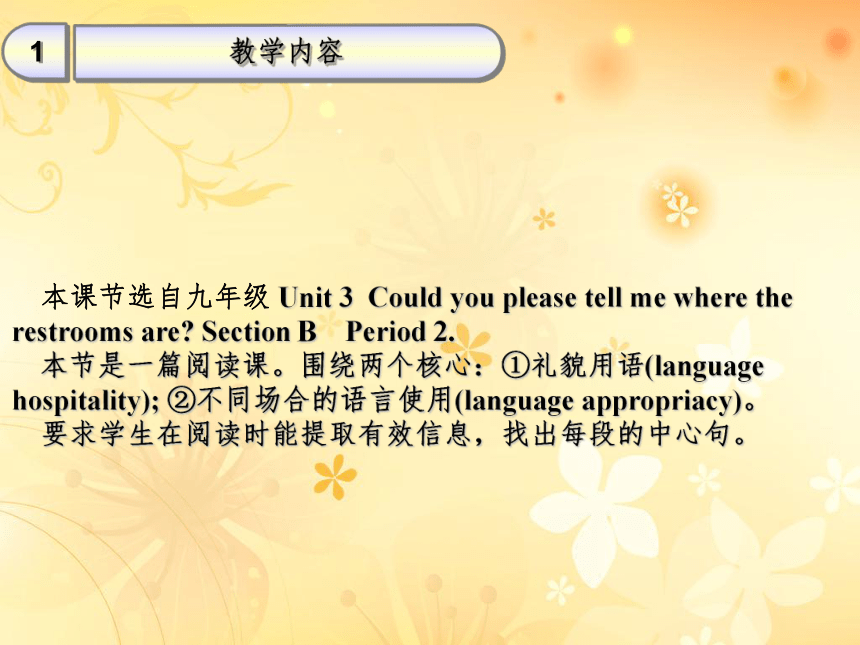
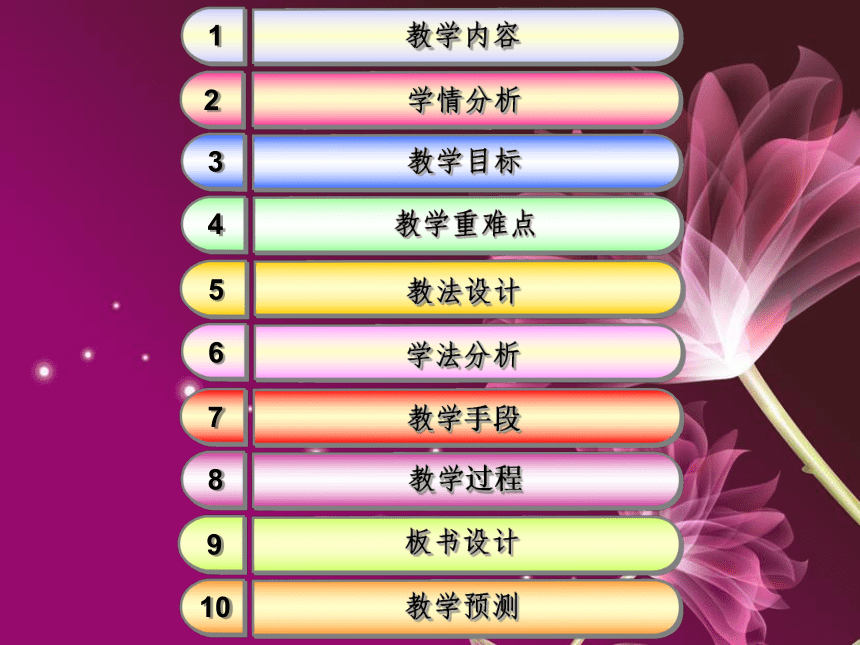
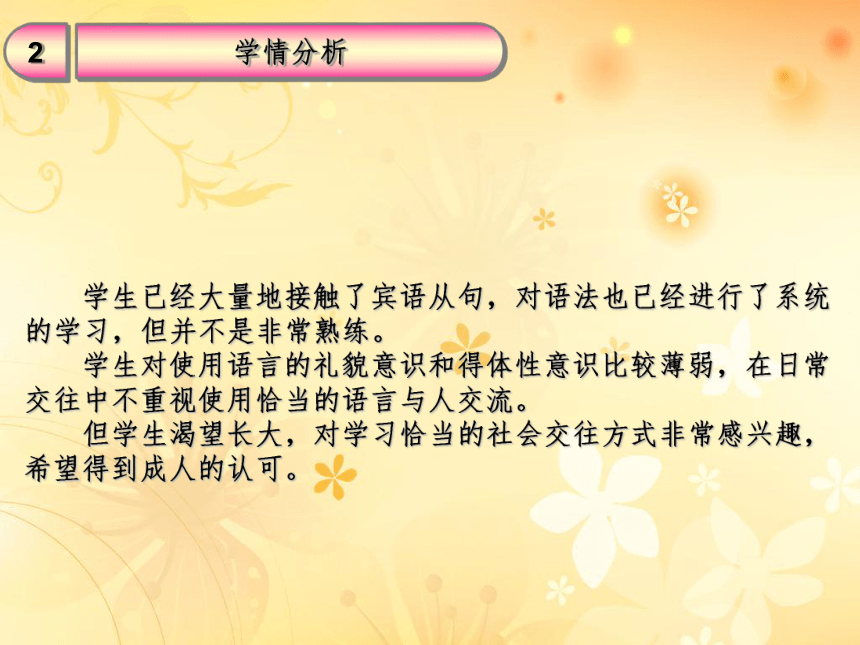
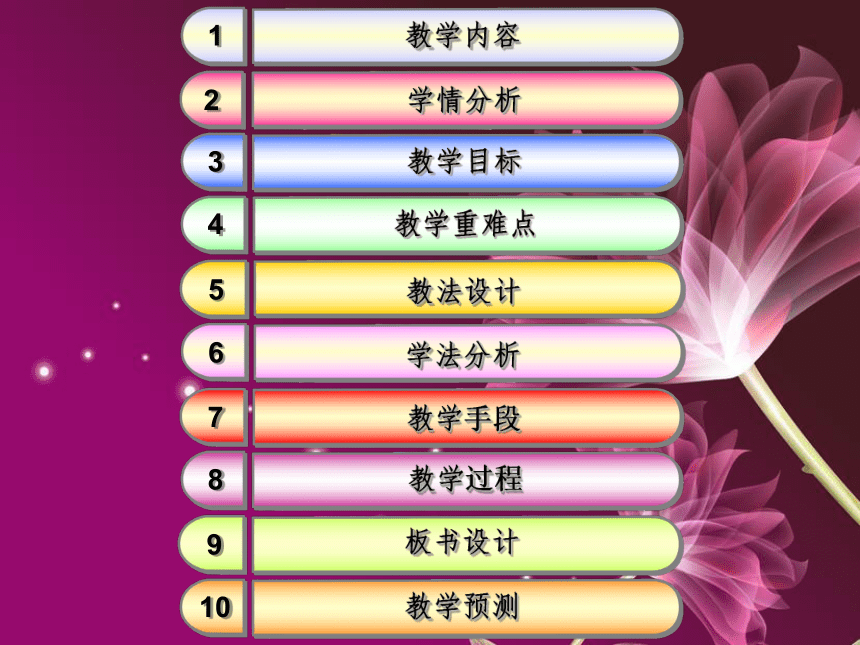
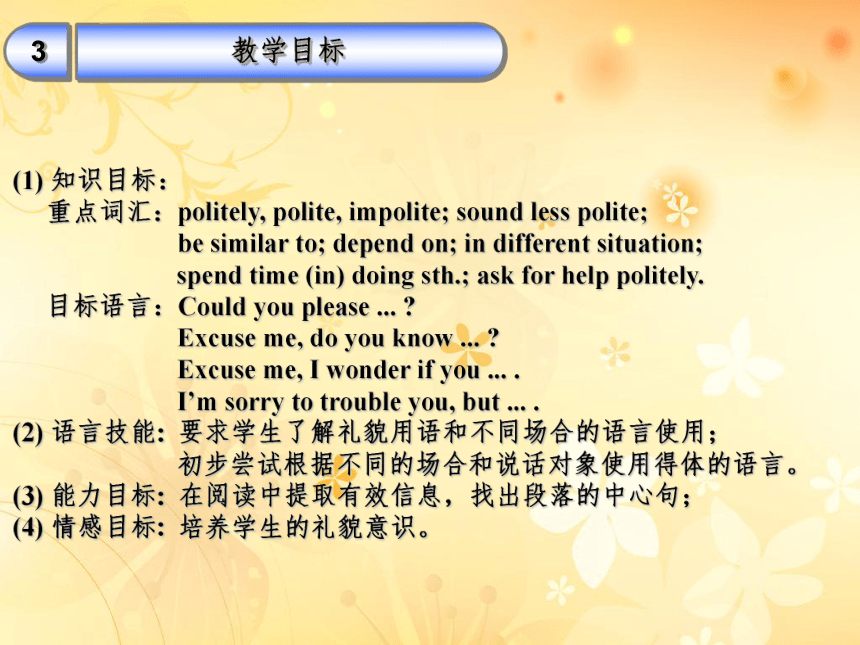
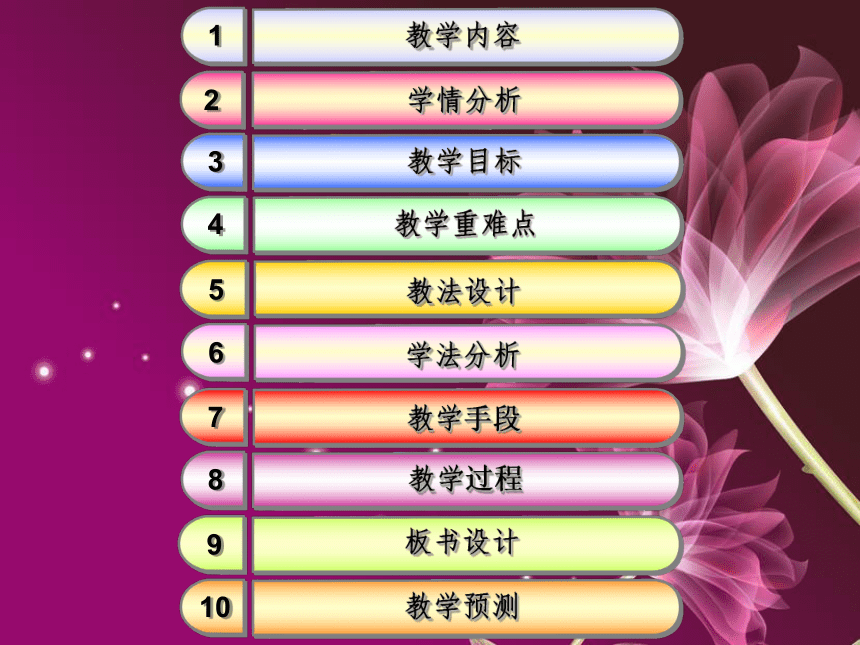
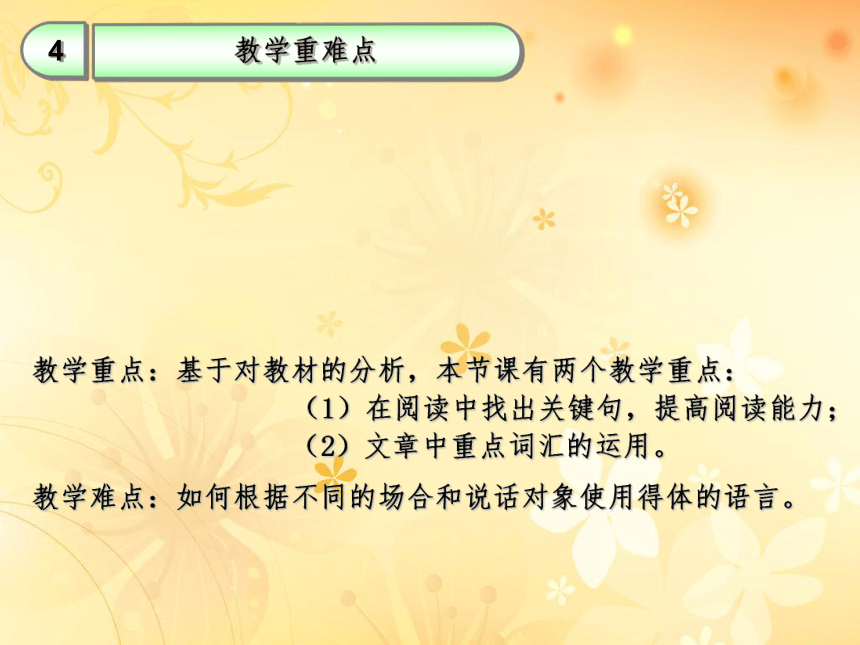
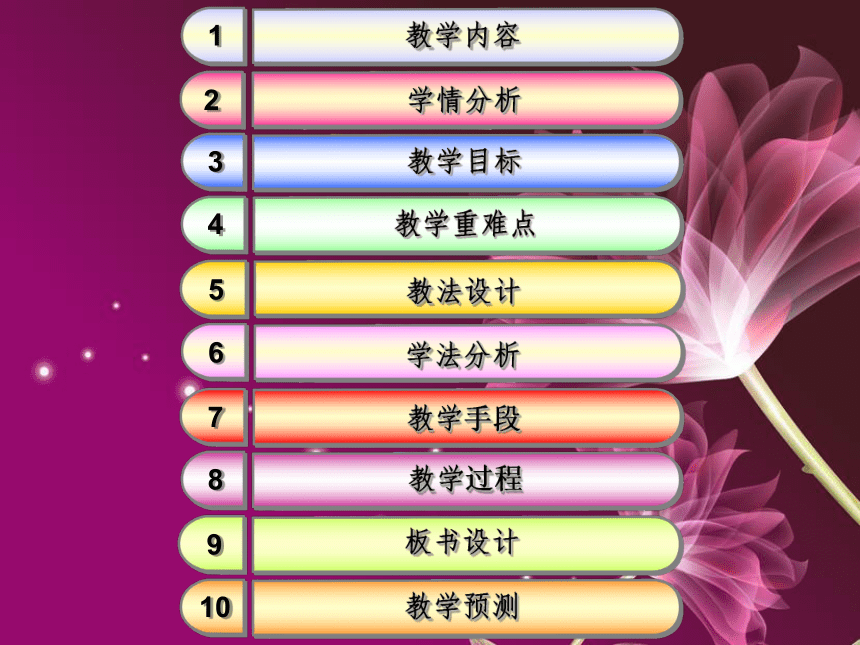
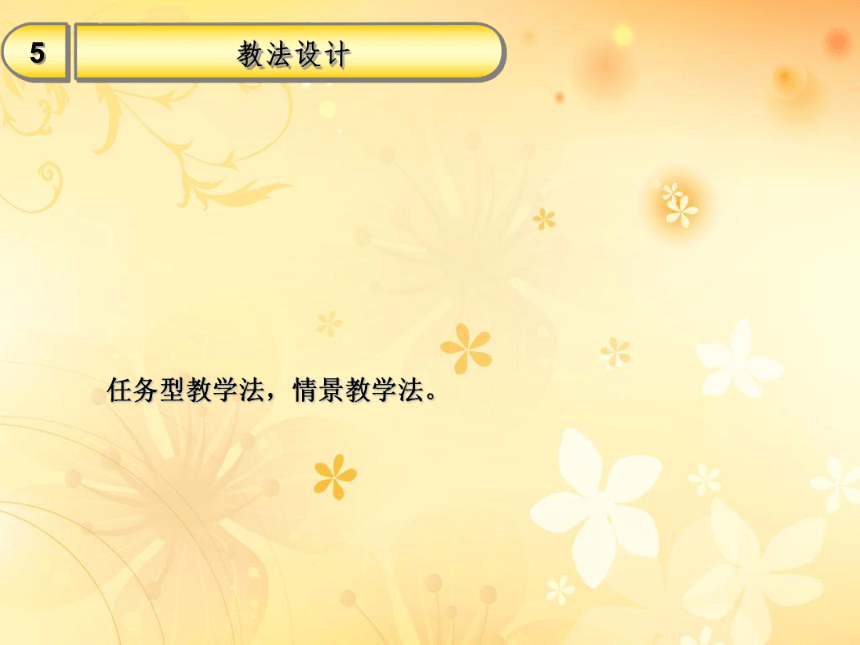
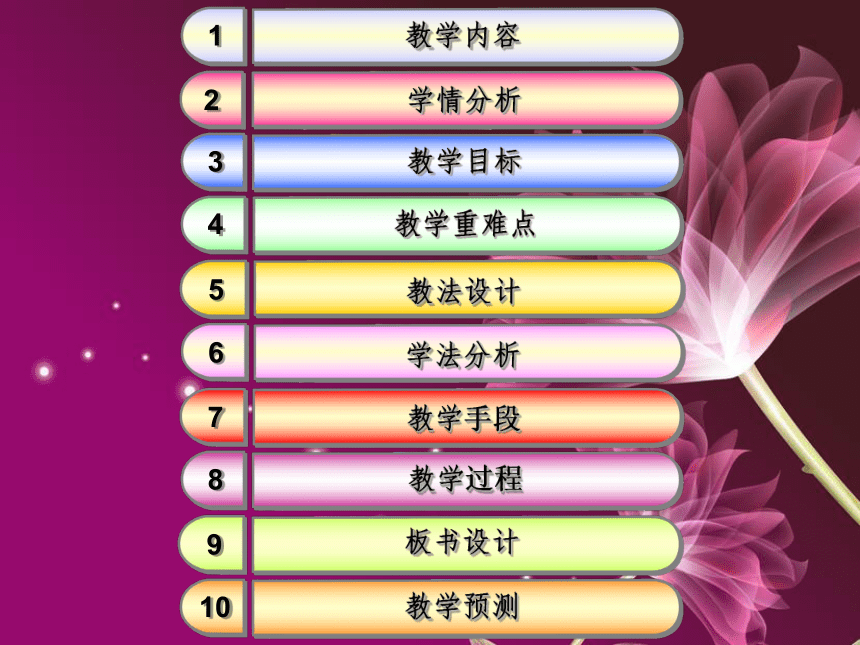
文档简介
课件35张PPT。Unit 3
Could you please tell me
where the restrooms are?
Section B Period 2
重庆市松树桥中学 曹波春Go for it!
Book 5 本课节选自九年级 Unit 3 Could you please tell me where the restrooms are? Section B Period 2.
本节是一篇阅读课。围绕两个核心:①礼貌用语(language hospitality); ②不同场合的语言使用(language appropriacy)。
要求学生在阅读时能提取有效信息,找出每段的中心句。 学生已经大量地接触了宾语从句,对语法也已经进行了系统的学习,但并不是非常熟练。
学生对使用语言的礼貌意识和得体性意识比较薄弱,在日常交往中不重视使用恰当的语言与人交流。
但学生渴望长大,对学习恰当的社会交往方式非常感兴趣,希望得到成人的认可。(1) 知识目标:
重点词汇:politely, polite, impolite; sound less polite;
be similar to; depend on; in different situation;
spend time (in) doing sth.; ask for help politely.
目标语言:Could you please ... ?
Excuse me, do you know ... ?
Excuse me, I wonder if you ... .
I’m sorry to trouble you, but ... .
(2) 语言技能: 要求学生了解礼貌用语和不同场合的语言使用;
初步尝试根据不同的场合和说话对象使用得体的语言。
(3) 能力目标: 在阅读中提取有效信息,找出段落的中心句;
(4) 情感目标: 培养学生的礼貌意识。教学重点:基于对教材的分析,本节课有两个教学重点:
(1)在阅读中找出关键句,提高阅读能力;
(2)文章中重点词汇的运用。
教学难点:如何根据不同的场合和说话对象使用得体的语言。任务型教学法,情景教学法。
根据课改“激发和培养学生学习英语的兴趣,使学生树立自信心,养成良好的学习习惯和形成有效的学习策略,发展自主学习的能力和合作精神”的要求,引导学生采取观察发现法、自主学习来对本节内容进行学习。
在学习过程中,学生可以就具体学习任务进行沟通和探讨,通过合作学习来降低学习难度。利用多媒体,课件来开展教学。Step 1 Lead in (5?? )
Step 2 Pre-reading (3?? )
Step 3 Fast reading (6?? )
Step 4 While-reading (7?? )
Step 5 Exercise (5?? )
Step 6 Post-reading (5?? )
Step 8 Complete the article (8?? )
Step 9 Homework (1?? )设计思路
在这个环节中,学生会用各种方式来提出请求。把学生的各种典型句子写在黑板上,其中把Direct questions和Polite requests
分类。
Step 1
Lead inMake a possible conversation.
Imagine you’re asking for a dictionary from Helen. What will the conversation be like?
You: ...
Helen: ...
You: ...
Helen: ...Pair work设计思路
让学生初步体会不同的表达方式,会取得不同的表达效果。
回答Why时,引导学生表达出impolite,polite和more polite。Guess.
Which student do you think I’ll lend money to?
A: Helen, can you lend me some money?
B: Helen, could you please lend me some money?
C: Helen, I’m sorry to trouble you ,but could you please lend me some money?
Why?设计思路
对课文内容进行预测,有利于学生理解文化。Step 2
Pre-readingAnswer the questions.
1. Where do we need to make polite requests?
2. What do they expressions you use depend on?
3. Are the requests in English the same as in Chinese?设计思路
通过整体的快速阅读,获取有效信息,初步掌握文章大意。
直观体会Direct questions和Polite requests区别。
Find all the direct questions and polite requests from the passage.
Step 3
Fast reading (2c)设计思路
检测学生是否真正理解文中观点所表达的真正含义。Step 4
While-readingMatch.
A
1. It is all right to ask direct questions to your classmates.
2. Polite questions are longer, including expressions such as “Could you please ...?” or “May I ask ...?”
3. We migh spend time
leading in to a request.Task 1
Match.B
a. “Could you please tell me where the hospital is?”
b. “When is the meeting?”
c. “Excuse me, I wonder if you can help me” or “I’m sorry to trouble you, but ...”设计思路
指导学生在文中找出关键句,提高获取信息的能力。Find out the key sentence of each paragraph.
Paragraph 1:When you visit a foreign country, it is important to know how to ask for help politely.
Paragraph 2: Good speakers change the way they speak in different situations.
Paragraph 3: Usually polite questions are longer.
Paragraph 4: It is important to learn how to use the right language in different situations. Task 2
Group work设计思路
通过填空来达成教学目标词汇。
同时熟悉课文的句子。Step 5
ExerciseFill in the blanks with different forms of “polite” .
It is important to know how to ask for help politely .
..., but the first one sounds less polite .
We also need to learn how to be polite when we ask for help.
However, if you say to your teacher, “When is the school trip?”, this might sound impolite .
But if you say, “Excuse me, Mr. West. Do you know when the school trip is?”, this will sound much more polite .
Usually polite questions are longer.
It might seem more di?cult to speak politely than directly.Without looking at the article,设计思路
展示课文中的目标词组,落实考点。Translation.
与...相似
依靠,依赖
在不同的场合里
花费时间做某事
与...沟通
礼貌地寻求帮助
听起来更不礼貌
be similar to
depend on
in different situation
spend time (in) doing sth
communicate with sb.
ask for help politely
sound less polite设计思路
通过对文中出现的目标语言及功能句型,再次强化目标语言的印象和使用场合,深刻理解礼貌用语得体使用的必要性。Read the requests and make a judge. (2d) Step 6
Post-reading设计思路
对本节课所学的两种表达方式进行总结,为后面的书面表达打下基础。Summary.
What are the direct questions you know?
What are the polite requests you know? Pair work设计思路
让学生仿写,可以巩固所学知识,同时扩展学生思路。Step 7
Complete the articleComplete the article.
Could You Please...?
When you visit a foreign country, it is important to know how to ask for help politely. For example, “ ?” or “ ?” These are similar requests for directions.Both are correct, but the first one sounds less polite. That is because it is a very direct question. It is not enough to just ask a question correctly. We also need to learn how to be polite when we ask for help.
Good speakers change the way they speak in different situations. The expressions they use might depend on whom they are speaking to or how well they know each other.It is all right to ask direct questions to your classmates because you know them well. However, if you say to your teacher, “ ?”, this might sound impolite. But if you say, “ ?”, this will sound much more polite.
Usually polite questions are longer. They include expressions such as“Could you please ...?” or “May I ask ...?” It sounds more polite to say, “ ?” than “ .”Sometimes we even need to spend time leading in to a request. For example, we might first say to a stranger, “Excuse me, I wonder if you can help me” or “I’m sorry to trouble you, but ...” before asking for help.
It might seem more di?cult to speak politely than directly. However, it is important to learn how to use the right language in different situations. This will help you communicate better with other people.设计思路
通过本课的学习,要求学生能够根据不同的场合和说话对象,运用得体的语言达到交流的目的。Step 8
HomeworkHomework:
Now you have no money, you want to borrow some from Helen or your friend Mike. Make two possible conversations.Unit 3
Could you please tell me
where the restrooms are?
Section B Period 2
1. politely, polite, impolite; sound less polite;
be similar to; depend on; in different situation;
spend time (in) doing sth.; ask for help politely.
2. Could you please ... ?
Excuse me, do you know ... ?
Excuse me, I wonder if you ... .
I’m sorry to trouble you, but ... .
.设计思路:突出本节课的重难点。 在最后一个环节仿写课文句子中,学生能不能打开思路决定于之前的引导。如果学生能打开思路,那么本课的目标语言就能够得到充分练习。根据学生平时的活跃程度,可以适当增加图片或视屏,来帮助学生运用更加丰富的句子。Could You Please...?
When you visit a foreign country, it is important to know how to ask for help politely. For example, “Where are the restrooms?” or“Could you please tell me where the restrooms are?” These are similar requests for directions.Both are correct, but the first one sounds less polite. That is because it is a very direct question. It is not enough to just ask a question correctly. We also need to learn how to be polite when we ask for help.
Good speakers change the way they speak in different situations. The expressions they use might depend on whom they are speaking to or how well they know each other.It is all right to ask direct questions to your classmates because you know them well. However, if you say to your teacher, “When is the school trip?”, this might sound impolite. But if you say, “Excuse me, Mr. West. Do you know when the school trip is?”, this will sound much more polite.
Usually polite questions are longer. They include expressions such as“Could you please ...?” or “May I ask ...?” It sounds more polite to say, “Peter,could you please tell me your e-mail address?” than “Peter, tell me your e-mail address.”Sometimes we even need to spend time leading in to a request. For example, we might first say to a stranger, “Excuse me, I wonder if you can help me” or “I’m sorry to trouble you, but ...” before asking for help.
It might seem more di?cult to speak politely than directly. However, it is important to learn how to use the right language in different situations. This will help you communicate better with other people.
Could you please tell me
where the restrooms are?
Section B Period 2
重庆市松树桥中学 曹波春Go for it!
Book 5 本课节选自九年级 Unit 3 Could you please tell me where the restrooms are? Section B Period 2.
本节是一篇阅读课。围绕两个核心:①礼貌用语(language hospitality); ②不同场合的语言使用(language appropriacy)。
要求学生在阅读时能提取有效信息,找出每段的中心句。 学生已经大量地接触了宾语从句,对语法也已经进行了系统的学习,但并不是非常熟练。
学生对使用语言的礼貌意识和得体性意识比较薄弱,在日常交往中不重视使用恰当的语言与人交流。
但学生渴望长大,对学习恰当的社会交往方式非常感兴趣,希望得到成人的认可。(1) 知识目标:
重点词汇:politely, polite, impolite; sound less polite;
be similar to; depend on; in different situation;
spend time (in) doing sth.; ask for help politely.
目标语言:Could you please ... ?
Excuse me, do you know ... ?
Excuse me, I wonder if you ... .
I’m sorry to trouble you, but ... .
(2) 语言技能: 要求学生了解礼貌用语和不同场合的语言使用;
初步尝试根据不同的场合和说话对象使用得体的语言。
(3) 能力目标: 在阅读中提取有效信息,找出段落的中心句;
(4) 情感目标: 培养学生的礼貌意识。教学重点:基于对教材的分析,本节课有两个教学重点:
(1)在阅读中找出关键句,提高阅读能力;
(2)文章中重点词汇的运用。
教学难点:如何根据不同的场合和说话对象使用得体的语言。任务型教学法,情景教学法。
根据课改“激发和培养学生学习英语的兴趣,使学生树立自信心,养成良好的学习习惯和形成有效的学习策略,发展自主学习的能力和合作精神”的要求,引导学生采取观察发现法、自主学习来对本节内容进行学习。
在学习过程中,学生可以就具体学习任务进行沟通和探讨,通过合作学习来降低学习难度。利用多媒体,课件来开展教学。Step 1 Lead in (5?? )
Step 2 Pre-reading (3?? )
Step 3 Fast reading (6?? )
Step 4 While-reading (7?? )
Step 5 Exercise (5?? )
Step 6 Post-reading (5?? )
Step 8 Complete the article (8?? )
Step 9 Homework (1?? )设计思路
在这个环节中,学生会用各种方式来提出请求。把学生的各种典型句子写在黑板上,其中把Direct questions和Polite requests
分类。
Step 1
Lead inMake a possible conversation.
Imagine you’re asking for a dictionary from Helen. What will the conversation be like?
You: ...
Helen: ...
You: ...
Helen: ...Pair work设计思路
让学生初步体会不同的表达方式,会取得不同的表达效果。
回答Why时,引导学生表达出impolite,polite和more polite。Guess.
Which student do you think I’ll lend money to?
A: Helen, can you lend me some money?
B: Helen, could you please lend me some money?
C: Helen, I’m sorry to trouble you ,but could you please lend me some money?
Why?设计思路
对课文内容进行预测,有利于学生理解文化。Step 2
Pre-readingAnswer the questions.
1. Where do we need to make polite requests?
2. What do they expressions you use depend on?
3. Are the requests in English the same as in Chinese?设计思路
通过整体的快速阅读,获取有效信息,初步掌握文章大意。
直观体会Direct questions和Polite requests区别。
Find all the direct questions and polite requests from the passage.
Step 3
Fast reading (2c)设计思路
检测学生是否真正理解文中观点所表达的真正含义。Step 4
While-readingMatch.
A
1. It is all right to ask direct questions to your classmates.
2. Polite questions are longer, including expressions such as “Could you please ...?” or “May I ask ...?”
3. We migh spend time
leading in to a request.Task 1
Match.B
a. “Could you please tell me where the hospital is?”
b. “When is the meeting?”
c. “Excuse me, I wonder if you can help me” or “I’m sorry to trouble you, but ...”设计思路
指导学生在文中找出关键句,提高获取信息的能力。Find out the key sentence of each paragraph.
Paragraph 1:When you visit a foreign country, it is important to know how to ask for help politely.
Paragraph 2: Good speakers change the way they speak in different situations.
Paragraph 3: Usually polite questions are longer.
Paragraph 4: It is important to learn how to use the right language in different situations. Task 2
Group work设计思路
通过填空来达成教学目标词汇。
同时熟悉课文的句子。Step 5
ExerciseFill in the blanks with different forms of “polite” .
It is important to know how to ask for help politely .
..., but the first one sounds less polite .
We also need to learn how to be polite when we ask for help.
However, if you say to your teacher, “When is the school trip?”, this might sound impolite .
But if you say, “Excuse me, Mr. West. Do you know when the school trip is?”, this will sound much more polite .
Usually polite questions are longer.
It might seem more di?cult to speak politely than directly.Without looking at the article,设计思路
展示课文中的目标词组,落实考点。Translation.
与...相似
依靠,依赖
在不同的场合里
花费时间做某事
与...沟通
礼貌地寻求帮助
听起来更不礼貌
be similar to
depend on
in different situation
spend time (in) doing sth
communicate with sb.
ask for help politely
sound less polite设计思路
通过对文中出现的目标语言及功能句型,再次强化目标语言的印象和使用场合,深刻理解礼貌用语得体使用的必要性。Read the requests and make a judge. (2d) Step 6
Post-reading设计思路
对本节课所学的两种表达方式进行总结,为后面的书面表达打下基础。Summary.
What are the direct questions you know?
What are the polite requests you know? Pair work设计思路
让学生仿写,可以巩固所学知识,同时扩展学生思路。Step 7
Complete the articleComplete the article.
Could You Please...?
When you visit a foreign country, it is important to know how to ask for help politely. For example, “ ?” or “ ?” These are similar requests for directions.Both are correct, but the first one sounds less polite. That is because it is a very direct question. It is not enough to just ask a question correctly. We also need to learn how to be polite when we ask for help.
Good speakers change the way they speak in different situations. The expressions they use might depend on whom they are speaking to or how well they know each other.It is all right to ask direct questions to your classmates because you know them well. However, if you say to your teacher, “ ?”, this might sound impolite. But if you say, “ ?”, this will sound much more polite.
Usually polite questions are longer. They include expressions such as“Could you please ...?” or “May I ask ...?” It sounds more polite to say, “ ?” than “ .”Sometimes we even need to spend time leading in to a request. For example, we might first say to a stranger, “Excuse me, I wonder if you can help me” or “I’m sorry to trouble you, but ...” before asking for help.
It might seem more di?cult to speak politely than directly. However, it is important to learn how to use the right language in different situations. This will help you communicate better with other people.设计思路
通过本课的学习,要求学生能够根据不同的场合和说话对象,运用得体的语言达到交流的目的。Step 8
HomeworkHomework:
Now you have no money, you want to borrow some from Helen or your friend Mike. Make two possible conversations.Unit 3
Could you please tell me
where the restrooms are?
Section B Period 2
1. politely, polite, impolite; sound less polite;
be similar to; depend on; in different situation;
spend time (in) doing sth.; ask for help politely.
2. Could you please ... ?
Excuse me, do you know ... ?
Excuse me, I wonder if you ... .
I’m sorry to trouble you, but ... .
.设计思路:突出本节课的重难点。 在最后一个环节仿写课文句子中,学生能不能打开思路决定于之前的引导。如果学生能打开思路,那么本课的目标语言就能够得到充分练习。根据学生平时的活跃程度,可以适当增加图片或视屏,来帮助学生运用更加丰富的句子。Could You Please...?
When you visit a foreign country, it is important to know how to ask for help politely. For example, “Where are the restrooms?” or“Could you please tell me where the restrooms are?” These are similar requests for directions.Both are correct, but the first one sounds less polite. That is because it is a very direct question. It is not enough to just ask a question correctly. We also need to learn how to be polite when we ask for help.
Good speakers change the way they speak in different situations. The expressions they use might depend on whom they are speaking to or how well they know each other.It is all right to ask direct questions to your classmates because you know them well. However, if you say to your teacher, “When is the school trip?”, this might sound impolite. But if you say, “Excuse me, Mr. West. Do you know when the school trip is?”, this will sound much more polite.
Usually polite questions are longer. They include expressions such as“Could you please ...?” or “May I ask ...?” It sounds more polite to say, “Peter,could you please tell me your e-mail address?” than “Peter, tell me your e-mail address.”Sometimes we even need to spend time leading in to a request. For example, we might first say to a stranger, “Excuse me, I wonder if you can help me” or “I’m sorry to trouble you, but ...” before asking for help.
It might seem more di?cult to speak politely than directly. However, it is important to learn how to use the right language in different situations. This will help you communicate better with other people.
同课章节目录
- Unit 1 How can we become good learners.
- Section A
- Section B
- Unit 2 I think that mooncakes are delicious!
- Section A
- Section B
- Unit 3 Could you please tell me where the restroom
- Section A
- Section B
- Unit 4 I used to be afraid of the dark.
- Section A
- Section B
- Unit 5 What are the shirts made of?
- Section A
- Section B
- Review of Units 1-5
- Unit 6 When was it invented?
- Section A
- Section B
- Unit 7 Teenagers should be allowed to choose their
- Section A
- Section B
- Unit 8 It must belong to Carla.
- Section A
- Section B
- Unit 9 I like music that I can dance to.
- Section A
- Section B
- Unit 10 You're supposed to shake hands.
- Section A
- Section B
- Review of Units 6-10
- Unit 11 Sad movies make me cry.
- Section A
- Section B
- Unit 12 Life is full of the unexpected
- Section A
- Section B
- Unit 13 We're trying to save the earth!
- Section A
- Section B
- Unit 14 I remember meeting all of you in Grade 7.
- Section A
- Section B
- Review of Units 11-14
